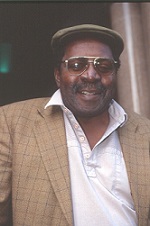Annual Gondwe Lecture features charge to rethink inclusion for those with disability
By Ben Pontz, Events Coverage Coordinator
In 1963, a young man from Malawi enrolled at Lake Forest College in Chicago. He lived with a host family and eventually landed a job at a small college in rural Pennsylvania where he would teach for the next 27 years. That college, of course, was Gettysburg College and the man was Derrick Gondwe, the first black person to receive tenure at the College. Gondwe died in 2004 and each year since, his former departments – Africana Studies and Economics – have organized a lecture endowed by his former host family in his memory.
This year’s lecture was held on Thursday and the keynote speaker was Charlotte Vuyiswa McClain-Nhlapo, a lawyer who works at the World Bank as a global disability advisor. McClain spoke about the need to specifically incorporate disability inclusion into the broader concept of social inclusion. Visiting Assistant Professor of Africana Studies Chipo Dondere, a Gondwe Post-Doctoral Fellow serving a faculty appointment at the College, teared up as she introduced McClain, whom she invited to speak. Dondere’s admiration of McClain was palpable, and her introduction certainly drew in the audience, which filled Mara Auditorium.
“We live in a world where we don’t seem to grasp that inclusion requires ongoing, renegotiated, and authentic dialogue, and the need to forge partnership with those groups that are typically marginalized,” McClain began.
She went on to tell the story of how she became confined to a wheelchair in an accident, juxtaposing her rehabilitation experience with that of a poor woman who faced domestic abuse and died shortly after her discharge to reinforce the point that persons living with disability come from a variety of other groups and that analyzing only one group does a disservice to such individuals. Consequently, she advocates an approach of people-centered service delivery, which requires a conversation with individuals receiving a service to tailor the service to the person rather than the person to the service.
People-centered service delivery was one of five building blocks for improving disability inclusion that McClain offered. She also mentioned the growing disparity in income and other forms of inequality; persons with disability are 80 percent more likely to live in poverty.
McClain advocates strong legal protection for those with disabilities, and she pointed to the Americans with Disabilities Act (ADA) as an example of successful legislation that made public places in the United States far more accessible to those with disabilities. Still, McClain acknowledges counterarguments that such accommodations can be too costly; she disputes them, however, noting that what is good for her (i.e. a ramp) is also good for older people and parents of younger children.
Overall, McClain sees reason for optimism and hope based on the developments of the recent past and codification of future goals, specifically the Sustainable Development Goals adopted by the United Nations in 2015.
“We need a fundamental paradigm shift that recognizes the dignity of the human being,” she said. “We need to have the confidence to engage and interact with each other to build mutual trust while acknowledging our differences. Social inclusion is not about everyone being the same, but it is about respect, value, and trust.”

